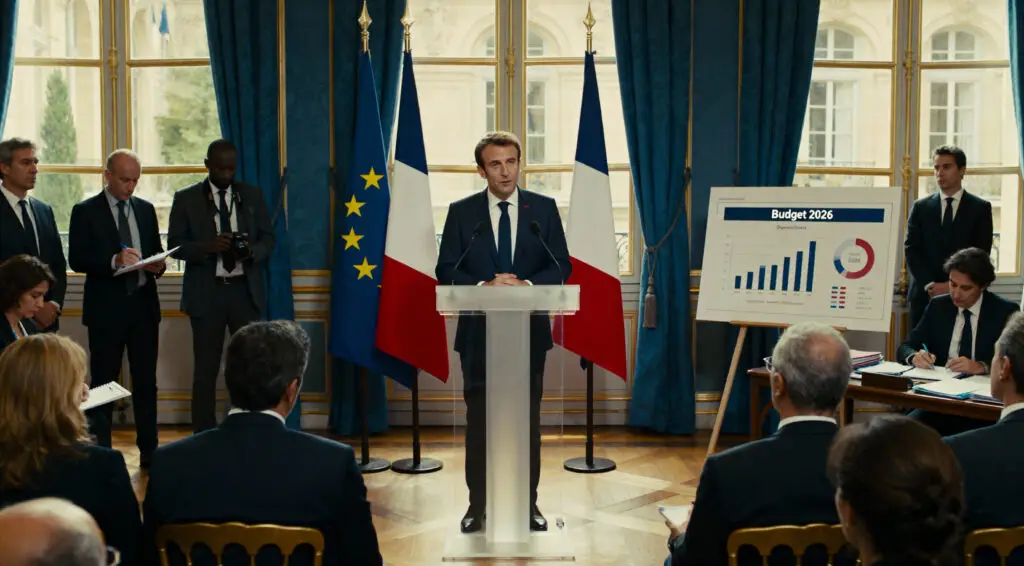Lecornu Pushes for Budget Deal to Ease Crisis
Caretaker Prime Minister Sebastien Lecornu has expressed cautious optimism that France may avoid dissolving parliament after holding talks with party leaders. The meetings sought consensus on a budget plan to address growing debt and end months of political gridlock.
Lecornu revealed that discussions showed a “momentum of convergence,” suggesting a willingness among factions to pass austerity measures before year-end. His remarks offered a glimmer of stability amid one of the most turbulent phases of Emmanuel Macron’s presidency.
Macron Faces Intensifying Political Pressure
President Macron’s administration remains engulfed in crisis after Lecornu became the fifth prime minister to resign in under two years. The inability to pass a national budget and secure parliamentary backing has fueled demands for Macron’s resignation before his term ends in 2027.
Far-right and left-wing leaders alike accuse him of clinging to power despite losing legislative control. This rare alignment of opposition forces has placed France’s centrist government under unprecedented strain, with public confidence reaching record lows.
Deficit Target and Pension Reforms in Focus
Lecornu confirmed that party leaders agreed to maintain France’s deficit below five percent of GDP for 2026. This commitment, he said, was crucial to preserving fiscal credibility with European partners. However, he hinted that concessions might be made on the controversial pension reform raising the retirement age to sixty-four.
The reform, initially pushed through by former Prime Minister Elisabeth Borne, triggered mass protests across France in 2023. Borne herself recently stated she would consider suspending the reform to unlock political negotiations.
Resistance From the Conservative Bloc
Despite tentative progress, resistance remains strong among conservative lawmakers. Valerie Pecresse of the Republicans warned that freezing the pension reform would “allow deficits to explode,” calling it a betrayal of fiscal responsibility.
Such opposition highlights the fragile balance Lecornu must navigate to secure approval of the budget. Without a governing majority, Macron’s administration has struggled to enact key policies, relying instead on executive decrees and last-minute compromises.
Macron’s Allies Begin to Break Ranks
The ongoing turmoil has begun eroding support even within Macron’s centrist alliance. Gabriel Attal, leader of the Renaissance party, publicly questioned the president’s recent decisions, saying his approach “shows a relentless desire to stay in control.”
Former prime minister Edouard Philippe echoed the sentiment, urging Macron to “step aside for the sake of stability.” Analysts note that growing dissent from within Macron’s own camp could prove more damaging than attacks from rivals, signaling a leadership crisis nearing its peak.
Far-Right and Far-Left United in Opposition
Marine Le Pen and Jordan Bardella of the National Rally have refused to participate in Lecornu’s talks, dismissing them as political theatre. Le Pen reiterated her demand for early elections, accusing Macron of “riding the horse for a rodeo rather than to lead the country.” Similarly, far-left leader Jean-Luc Mélenchon and Republican chief François-Xavier Bellamy called for Macron’s resignation, arguing that France’s government has lost all legitimacy. With opposition parties dominating public opinion polls, Macron’s isolation appears increasingly irreversible.
A Nation Waiting for Resolution
As Lecornu prepares to submit his final report to the president, France remains at a crossroads. The coming weeks will determine whether political leaders can reach a compromise or if Macron’s presidency faces an early and dramatic end.
Analysts suggest that while a short-term budget deal may avert immediate collapse, it will not resolve the deeper divisions paralyzing French politics. For now, the nation watches closely as its government grapples with the dual challenge of restoring economic order and political trust.























